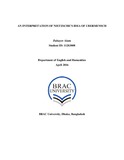| dc.contributor.advisor | Chowdhury, Rukhsana Rahim | |
| dc.contributor.author | Alam, Zubayer | |
| dc.date.accessioned | 2016-06-02T10:31:48Z | |
| dc.date.available | 2016-06-02T10:31:48Z | |
| dc.date.copyright | 2016 | |
| dc.date.issued | 2016-04 | |
| dc.identifier.other | ID 11203008 | |
| dc.identifier.uri | http://hdl.handle.net/10361/5430 | |
| dc.description | This thesis is submitted in partial fulfillment of the requirements for the degree of Bachelor of Arts in English, 2016. | en_US |
| dc.description | Cataloged from PDF version of thesis. | |
| dc.description | Includes bibliographical references (page 33- 35). | |
| dc.description.abstract | “All things are subject to interpretation. Whichever interpretation prevails at a given time is a function of power and not truth.”
Friedrich Nietzsche (Daybreak, 16).
Friedrich Nietzsche is popularly seen as the enigmatic madman of German philosophy. A solitary free thinker who wrote audacious maxims like-“God is dead”, “There is no fact only interpretations”. We may often laugh at his sayings at first sight but when we carefully reflect on what he is trying to say through his outstanding maxims, essays or prose we are bound to find that it is not us who are laughing at him; but it is he who is actually laughing at us. Whatever it is, western philosophy after Nietzsche is no longer the same. Before Nietzsche, philosophy was a hard enough pill for the average mind to swallow, but after him it has becomes hard for the philosophers themselves. He questions and critiques our traditional understanding of truth, morality, knowledge, power, modernity, justice even the privileged position of questioning philosophy in such a radical way.
One of the most profound ideas that Nietzsche put into the landscape of western philosophy is his idea of the “Ubermensch” which is generally translated into English as ‘Over Man'. But what is “Ubermensch”? What is he trying to say by this word “Ubermensch”? Is he trying to say anything or not? All these questions can be examined in a certain manner if we try to understand the relation between ‘ubermensch’ and ‘mensch’ (overman and man) which Nietzsche proposes in his famous book “Thus Spake Zarathrustra”. “The overman is the meaning of the earth. Let your will say: the overman shall be the meaning of the earth... Man is a rope, tied between beasts and overman—a rope over an abyss”. (Thus spake Zarathustra 18). Nietzsche questions the established worldview of mankind. If he had lived long enough (not died in 1900) he probably would have claimed, “God is dead and with the death of God, man is dead too!” But what would he have meant by that?
This paper will look at the relation between the idea of Death of God and the Rise of “Ubermensch” and attempt to interpret the significance of this relationship. What does death mean when Nietzsche uses it so vigorously in his maxims? The paper will attempt to find an answer to such philosophical questions by presenting a brief overview of Nietzsche’s philosophy, in his own vocabulary.
In a strictly philosophical language, Nietzsche’s philosophy can be categorized in four ways: Ontological, Epistemological, Societal and Psychological. These categories will expand the idea of the “Ubermensch” and the thesis will explore any possibility of links between these categories and Nietzsche’s thought. The thesis will be comprised of the following chapters keeping this formal categorization in mind | en_US |
| dc.description.statementofresponsibility | Zubayer Alam | |
| dc.format.extent | 35 pages | |
| dc.language.iso | en | en_US |
| dc.publisher | BRAC University | en_US |
| dc.rights | BRAC University thesis are protected by copyright. They may be viewed from this source for any purpose, but reproduction or distribution in any format is prohibited without written permission. | |
| dc.subject | English and humanities | en_US |
| dc.title | An interpretation of nietzsche’s idea of ubermensch | en_US |
| dc.type | Thesis | en_US |
| dc.contributor.department | Department of English and Humanities, BRAC University | |
| dc.description.degree | B.A. in English | |

